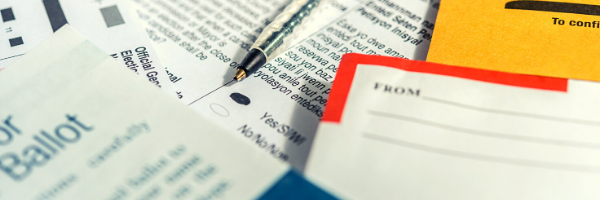States have enacted 72 bills and resolutions concerning the three powers of direct democracy in the U.S.—the ballot initiative, referendum, and recall election—in 2025 through Aug. 8. The average number of bills and resolutions enacted per year from 2018 to 2024 was 35.
While most bills are adopted during the first half of the year when state legislatures are in session, additional legislation can still be passed later in the year. This year's total (72) is more than double the average (35) for 2018 to 2024. The total also surpasses the previous high of 41 in 2024.
State comparisons
As of Aug. 8, 2025, 72 bills had been enacted into law across 23 states concerning direct democracy.
- Arkansas had the most enacted changes, with 17 pieces of legislation adopted.
- South Dakota had the second most, with 10 bills adopted.
- North Dakota had the third most, with eight bills adopted.
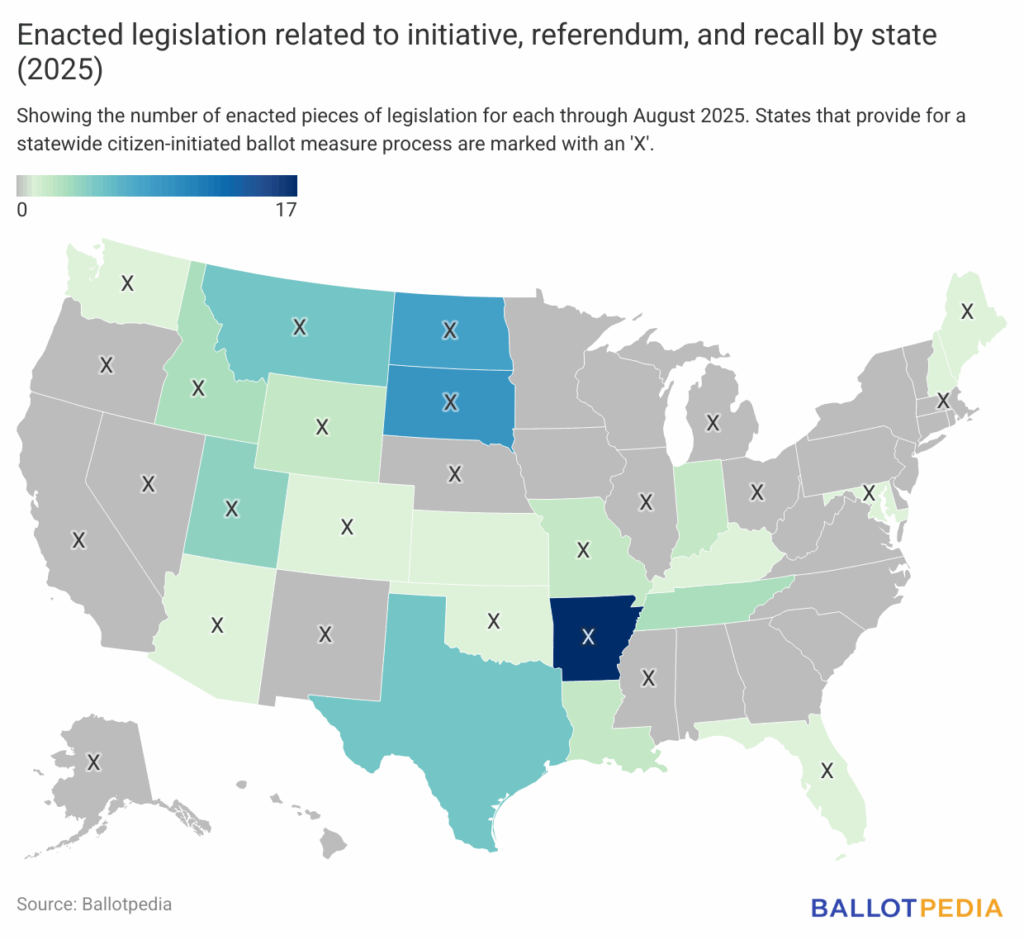
Legislative vote margins
A legislative vote margin refers to the difference in the level of support between Democrats and Republicans in state legislatures. This is similar to an election vote margin in which a candidate is said to have received, for example, 5 percentage points more than another candidate. A bill that receives support from 100% of legislative Republicans and 20% of legislative Democrats has a legislative vote margin of R+80%, for example.
Ballotpedia classifies legislative vote margins on legislation related to the initiative, referendum, and recall as follows:
- Republican: R+50.1% to R+100%
- Lean Republican: R+25.1% to R+50%
- Bipartisan: R+25% to D+25%, including 0%
- Lean Democratic: D+25.1% to D+50%
- Democratic: D+50.1% to D+100%
In 2025, 25 of the 72 enacted bills (35%) received bipartisan backing, 42 (58%) were passed with Republican majorities, and three (4%) with Democratic majorities. Two bills in Maine and New Hampshire were passed by voice vote, which meant the legislative vote margin could not be determined.
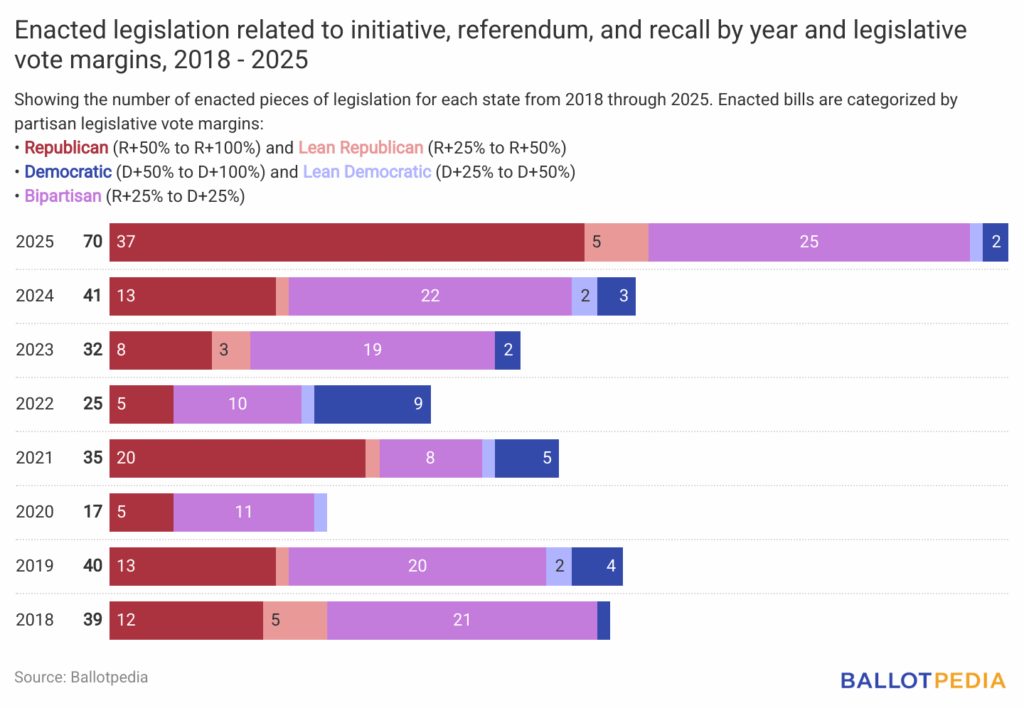
Ballot measures
In 2025, legislatures in four states—Idaho, North Dakota, South Dakota, and Utah—referred six constitutional amendments to the ballot for elections in 2026. These proposals would change ballot measure processes and require voter approval for ratification.
- Idaho HJR 4, Grant Legislature Exclusive Authority and Prohibit Citizen-Initiated Measures on Marijuana, Narcotics, and Psychoactive Substances Amendment: The constitutional amendment would provide that only the Idaho State Legislature shall have the authority to legalize marijuana, narcotics, or other psychoactive substances, thereby prohibiting any citizen-initiated ballot measures designed to legalize these drugs.
- North Dakota 60% Vote Requirement for Constitutional Amendments Measure: The amendment would require constitutional amendments initiated by citizens or referred by the state legislature to receive a 60% vote to be adopted.
- North Dakota Single-Subject Requirement for Constitutional Amendments Measure: The amendment would create a single-subject requirement for initiated constitutional amendments and legislatively referred constitutional amendments, and prohibit the secretary of state from approving an initiative for circulation if the initiative is determined to include more than one subject.
- South Dakota Constitutional Amendment L, 60% Vote Requirement for Constitutional Amendments Measure: The amendment would require a 60% majority by voters to approve constitutional amendments.
- Utah 60% Vote Requirement for Ballot Initiatives to Increase or Expand Taxes Amendment: The constitutional amendment would require citizen-initiated ballot measures to receive at least 60% voter approval to make certain tax-related changes, including (a) imposing a new tax; (b) expanding an existing tax to apply to additional items or transactions; (c) increasing an existing tax rate; or (d) adjusting a property tax rate in a way that reduces the rate less than it would decrease under current law
- Utah Publication Requirements for Constitutional Amendments Measure: The amendment would require that constitutional amendments be published, in a manner provided by the legislature, for 60 days immediately before the next general election.
Policy issue trends
Four of the most common areas of legislative changes in 2025 were: (1) laws governing foreign spending in ballot measure campaigns; (2) vote thresholds for ballot measures; (3) identification requirements for petition signers; and (4) ballot initiative circulation periods. In each of these four areas, all legislative changes moved in the same direction.
- Changes to laws governing foreign spending in ballot measure campaigns: Nine states—Arkansas, Indiana, Kansas, Kentucky, Louisiana, Missouri, Montana, Tennessee, and Wyoming—enacted laws prohibiting or increasing restrictions on foreign donor contributions to ballot measure campaigns. No bills were adopted to permit or decrease such restrictions. Support among legislative Republicans averaged 97%, while Democratic support was more divided, averaging 46%.
- Changes to vote thresholds for ballot measures: Three states—North Dakota, South Dakota, and Utah—passed constitutional amendments to increase the voter approval threshold required for ballot measures. Each of these proposals would raise the voter approval threshold to 60% for certain ballot measures. However, as constitutional amendments, each of these proposals requires voter approval in 2026. Support among legislative Republicans averaged 90%, while Democratic support averaged 6%.
- Changes to laws governing identification requirements for petition signers: Three states—Arkansas, Florida, and South Dakota—passed legislation adding or increasing identification requirements for petition signers. In Arkansas, SB 208 required signers to present a photo ID to canvassers. In Florida, HB 1205 required petition signatures to include a driver’s license, state ID, or the last four digits of their Social Security number. In South Dakota, SB 1256 required signers to provide their name, address matching their voter registration, and the date. Support among legislative Republicans averaged 93%, while Democratic support averaged 8%.
- Changes to ballot initiative circulation periods: Two states—Arkansas and South Dakota—passed legislation shortening the time period during which petition signatures for ballot initiatives are valid. No state enacted laws to lengthen circulation periods. Support among legislative Republicans averaged 90%, while Democratic support averaged 5%.
Enacted legislation compared to proposed legislation
As of Aug. 8, 2025, 46 states had introduced 587 legislative proposals related to ballot measures. Among the years Ballotpedia has tracked ballot measure legislation (2018–2025), 2025 recorded the greatest number of proposed bills. Of the 587 proposals introduced in 2025, 72 (12%) had been enacted. Missouri introduced the most proposals, with 53, enacting two. Texas introduced the second most, with 49 proposals, enacting five.
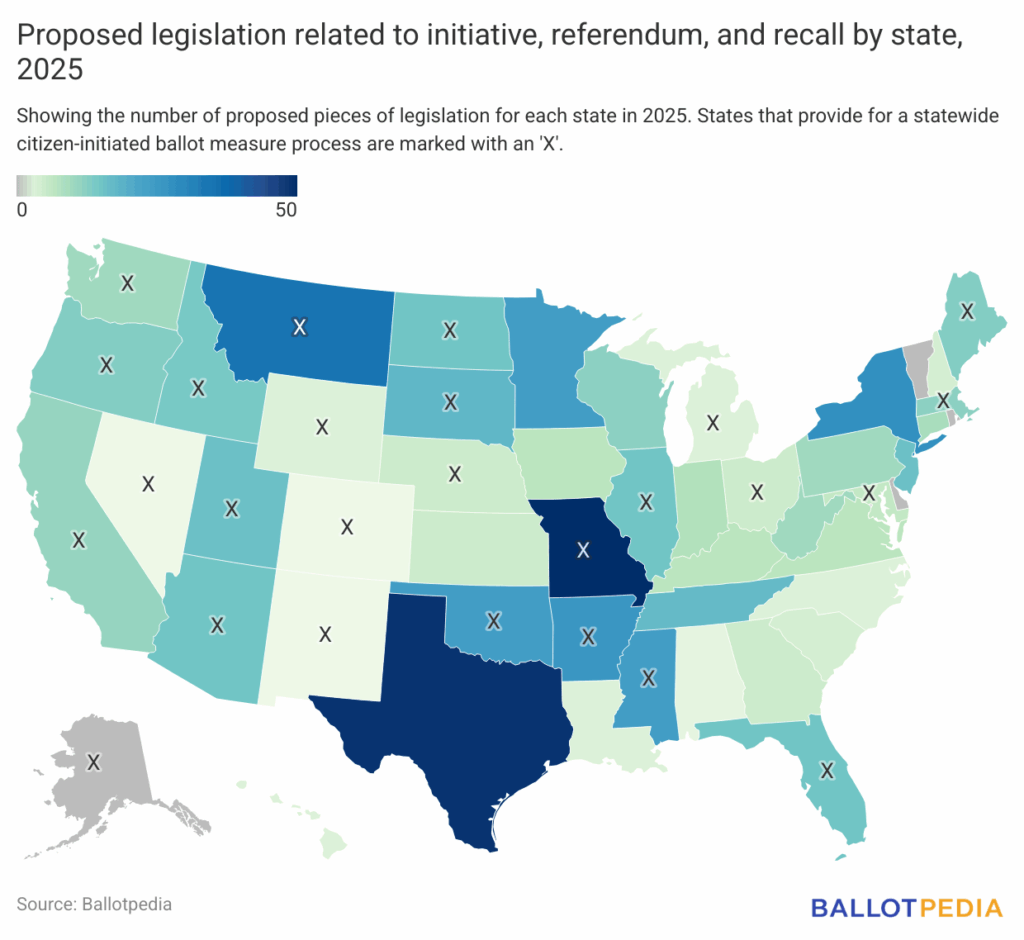
The majority of legislative proposals were in states with Republican state government trifectas. Of the 587 measures introduced, 362 (62%) originated in Republican trifecta states, 138 (24%) in Democratic trifecta states, and 87 (15%) in states with divided government.

States with Republican trifectas introduced the greatest number of proposals since at least 2018. Compared to last year, proposals from Republican trifecta states increased by 145%, while those from Democratic trifecta states increased by 3.7%.
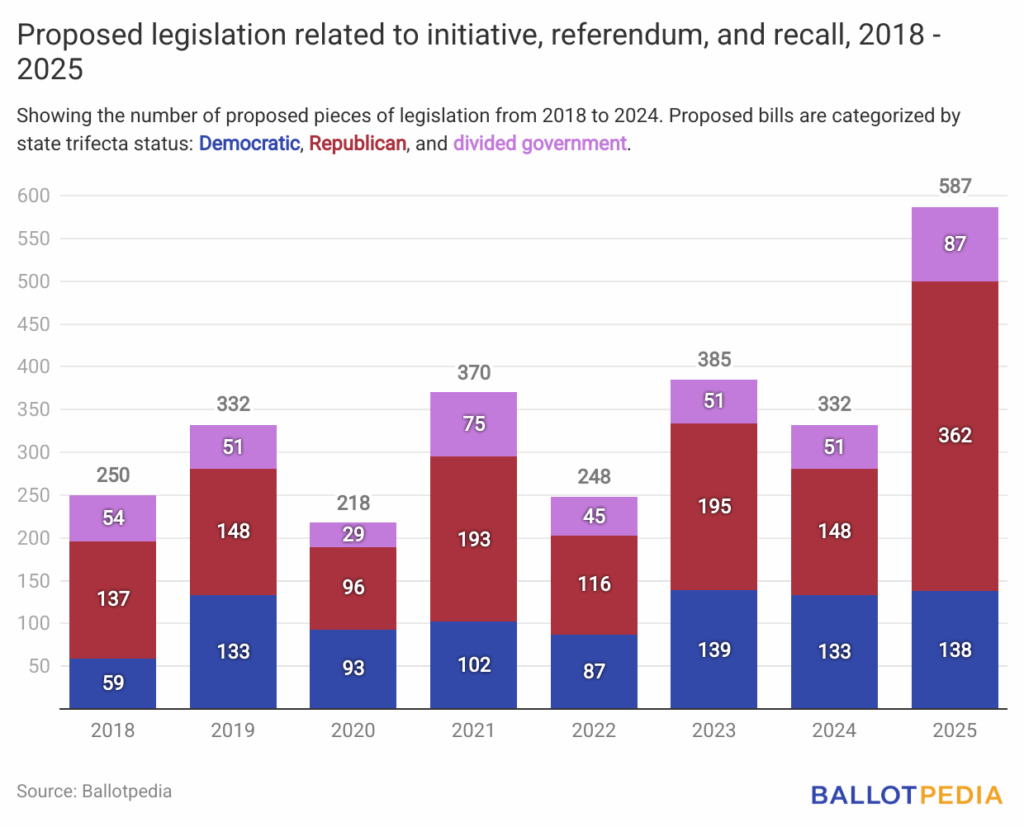
From 2018 to 2025, a total of 2,737 pieces of legislation related to initiative, referendum, and recall were introduced in state legislatures. Of these, state governments have enacted 320 pieces of legislation.
Additional reading:



